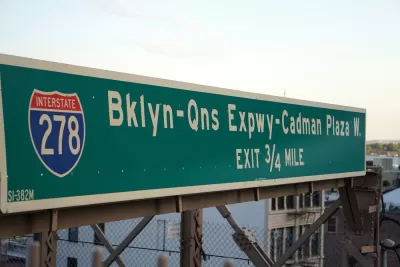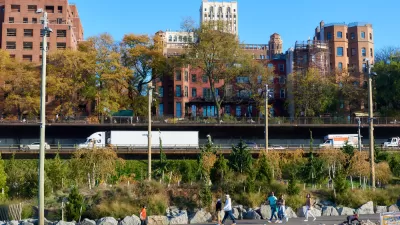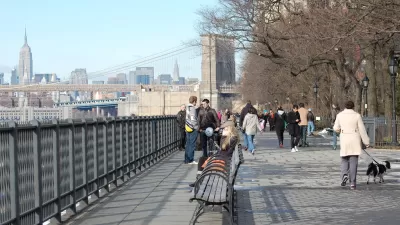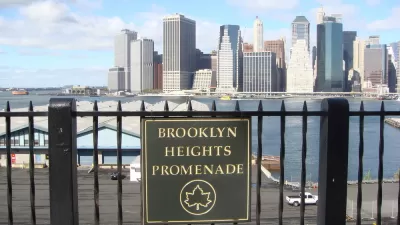The Brooklyn-Queens Expressway (BQE) is built atop of crumbling series of bridges. The city is expected to go in high gear on construction on Brooklyn's only interstate highway by the beginning of the next decade.

Dana Rubinstein reports on the ongoing need to repair a 1.25-mile stretch of the BQE in Brooklyn—at a cost of $1.7 billion. According to Rubinstein, the city has many bridges that are deteriorating and in need of repair of replacing, but this particular project could be particularly inconvenient:
New York City controls 789 bridges. Twenty-one, including three that comprise the base of the promenade, make up a 1.25-mile stretch of the BQE that the city admits is deteriorating. Within the next decade or so, the degradation will necessitate repairs, rendering that heavily trafficked portion of Brooklyn’s only interstate highway a construction-laden mess and sending tens of thousands of cars and trucks into the surrounding neighborhoods.
The city is expecting to begin construction on the BQE between 2020 and 2023; meanwhile an expected 12-year window of good repair is closing quickly. A spokesperson for the department of transportation has said this project is the city's number one priority—so much so that the department is "circumventing the normal chain of command."
"While a bureau inside the bridges department runs all other big-ticket bridge jobs, this project’s managers report directly to Robert Collyer, the department's deputy commissioner for bridges," according to Rubinstein.
Rubinstein also connects the problems with the bridges on the BQE with other large infrastructure projects like the ongoing project to repair the tunnels for the L Train under the East River, the delayed project to build a new cross-Hudson tunnel, and the renovation of LaGuardia Airport.

Alabama: Trump Terminates Settlements for Black Communities Harmed By Raw Sewage
Trump deemed the landmark civil rights agreement “illegal DEI and environmental justice policy.”

Planetizen Federal Action Tracker
A weekly monitor of how Trump’s orders and actions are impacting planners and planning in America.

Why Should We Subsidize Public Transportation?
Many public transit agencies face financial stress due to rising costs, declining fare revenue, and declining subsidies. Transit advocates must provide a strong business case for increasing public transit funding.

Understanding Road Diets
An explainer from Momentum highlights the advantages of reducing vehicle lanes in favor of more bike, transit, and pedestrian infrastructure.

New California Law Regulates Warehouse Pollution
A new law tightens building and emissions regulations for large distribution warehouses to mitigate air pollution and traffic in surrounding communities.

Phoenix Announces Opening Date for Light Rail Extension
The South Central extension will connect South Phoenix to downtown and other major hubs starting on June 7.
Urban Design for Planners 1: Software Tools
This six-course series explores essential urban design concepts using open source software and equips planners with the tools they need to participate fully in the urban design process.
Planning for Universal Design
Learn the tools for implementing Universal Design in planning regulations.
Caltrans
Smith Gee Studio
Institute for Housing and Urban Development Studies (IHS)
City of Grandview
Harvard GSD Executive Education
Toledo-Lucas County Plan Commissions
Salt Lake City
NYU Wagner Graduate School of Public Service





























